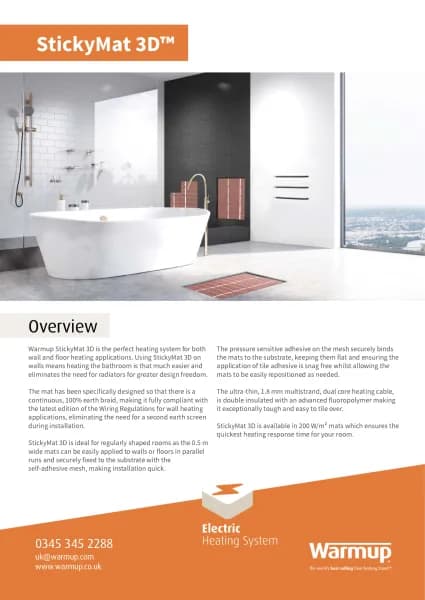Warmup Metro handleiding
Handleiding
Je bekijkt pagina 16 van 28

16
Step 5 - Lay the screed layer
• Heated screeds will expand and contract slightly during use therefore
expansion joints may also be required. As per: ISO 11855-5, an expansion
joint plan (including type and place of joint) shall be drawn up by the
building planner.
• A joint shall be applied above a building joint. The oor screed shall be
separate from rising elements (border joints, e.g. walls doorways etc.).
• The determination of joint width, joint distance and joint areas depends
on type of binder, oor covering geometry of the area, use of area and
temperature change.
1
Before installing any screed, oor nish, adhesives or glues over
the system, the installation requirements of each must be checked
to ensure compatibility with underoor heating.
Underoor heating performs the most eciently with conductive,
low resistance oor nishes such as stone and tiles.
Screed Type
Minimum thickness
(mm)
Standard
Traditional
cementitious
sand/cement
75 (65) BS 8204-1
Traditional
calcium sulfate
40 CIRIA Report 184
Pumpable
self-smoothing
calcium sulfate
40 (35) BS 8204-7
Pumpable
self-smoothing
cementitious
40 (35) BS 8204-7
Table 1 - Screed types and minimum thicknesses
Table 1 shows dierent screed materials used and minimum
thicknesses required with underoor heating systems. Domestic
measurements are in brackets. This table is for guidance only,
screed layers used over Warmup Metro must be chosen and
installed in line with the latest edition of building regulations and
standards.
Bekijk gratis de handleiding van Warmup Metro, stel vragen en lees de antwoorden op veelvoorkomende problemen, of gebruik onze assistent om sneller informatie in de handleiding te vinden of uitleg te krijgen over specifieke functies.
Productinformatie
| Merk | Warmup |
| Model | Metro |
| Categorie | Niet gecategoriseerd |
| Taal | Nederlands |
| Grootte | 7455 MB |







